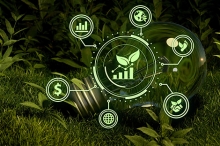
Delve: How the Era of Energy Transition Is Changing Business Leadership
The global transition to net-zero requires significant changes in the way businesses operate and grow. How can business leaders successfully manage this energy transition? What are its opportunities and risks for businesses? And what role do corporate boards and investors play in overseeing and encouraging the transition?

Delve: Why Accounting Holds the Key to Successful Sustainability Initiatives, with Brian Wenzel
What does accounting have to do with sustainability? Essentially, everything. Just as research and regulations around sustainability have expanded in recent years, so has sustainability accounting, focusing on activities of an organization that have a direct impact on its environmental, social, and governance (ESG) aspects.

McGill Desautels offices lead the way in Sustainable Workplace Certification
Three more teams at the McGill Desautels Faculty of Management have been recognized for their exceptional commitment to sustainable workplace practices. The IT Customer Service department and the Bachelor of Commerce program have both earned Bronze Certifications, while the McGill Executive Institute earned a Silver Certification.
Armstrong building has LEED Silver certification, leading future building projects to a higher standard
In 2017, the Donald E. Armstrong Building on McTavish Street, former home of the McGill bookstore, underwent extensive renovations, and it’s now the home of Desautels’ masters’ programs. Throughout the Armstrong building’s transformation, efforts were made to reduce environmental impact. Its energy efficiency was improved by 37% and water efficiency by 40%. McGill’s plans for the future are even more ambitious.

MMF Series: Where Are They Now? Spotlight on Mitchell McEwen (MMF’20)
Learn how the McGill Master of Management in Finance (MMF) can open a number of career doors. On this Earth Day, we catch up with an MMF alumnus working in ESG and Sustainable Finance, Mitchell McEwen (MMF’20). Now Senior Manager, Enterprise Sustainable Finance, TD Bank Group, he first joined the Bank as an Environmental, Social, and Governance (ESG) intern.

Delve: AI-griculture, A High-Tech Approach to Decarbonizing Agricultural Food Supply Chains
One of the largest contributors to climate change worldwide, the agricultural food supply chain crosses international borders and reaches across industries and sectors. Reducing its environmental impact requires complex, high-tech solutions like artificial intelligence—and the people to implement them at the right time, in the right places.

PIVOT platform is helping small businesses tackle climate change
Climate anxiety is real, and sometimes it can feel overwhelming, but the key to addressing it is to stop dwelling and start doing. Business owners can do more than most. The McGill Sustainability Systems Initiative wants to help them do exactly that, writes Prof. Karl Moore for Forbes.com. Called PIVOT for short, the program is led by Prof.

CIBC donates $1.25 million to the Sustainable Growth Initiative (SGI)
CIBC has donated $1.25 million to the Sustainable Growth Initiative (SGI) at McGill University's Desautels Faculty of Management.
New challenge drives awareness of the environmental impact of clothing
We all need to wear clothing, but the environmental impact of purchasing clothing is significant, and a new initiative asks people to reflect on their own consumption. Participants in the New Clothing Detox Challenge refrain from clothing purchases during the month of March.

Companies must decarbonize supply chains to reduce greenhouse gas emissions, and this can create risk for investors
As part of their effort to reduce emissions, large companies like McDonald’s have announced cuts to emissions from their own operations and power supply. These are known as Scope 1 and Scope 2 emissions, respectively. But large firms often do less to address emissions generated by the products they sell, which are known as Scope 3 emissions. McDonald’s is planning to install LED lights and power its restaurants with renewable energy.

Global competition gets students to take on challenge of investing sustainably
The 2022 McGill International Portfolio Challenge (MIPC), in its 6th year, asked undergraduate students from around the world to devise innovative portfolio strategies that could achieve high returns while still ensuring a sustainable future.

Delve: How Banks and Institutional Investment Funds Are Driving the Road to Net-Zero
One of the biggest challenges today for financial institutions is how to meet net-zero climate targets while achieving high returns on investment and satisfying the needs of various stakeholders. What does the road to net-zero look like in the realm of long-term investment, who are the players, and how should the inevitable roadblocks be overcome?

Clothing repairs and thrifting can help reduce the environmental footprint of the clothing you wear
Clothing companies used to offer just a few collections each year. Today, fast fashion companies like H&M or Zara offer dozens. One way they accomplish this is by reducing the quality of their clothing, but this increases the resources needed to make what we wear, and increases their environmental footprint as a result, said Javad Nasiry in an interview with BNN Bloomberg.

Eco-fashion brand Ecova tells the stories behind its green initiatives
Positive storytelling can encourage consumers to make better, more eco-conscious choices. That’s the vision the Stephanie Beaulieu (MBA’22) shared with Karl Moore in an article for Forbes.com. Beaulieu founded the eco-fashion company Ecova to make change in the fashion industry.

Delve: Why Environmental, Social, and Governance Investment Standards Need an Indigenous Perspective
In the high-stakes realm of finance and investment, environmental, social, and governance (ESG) criteria play a larger role than ever in companies’ decision making and commitment to creating shared value. In this accelerated transition toward cross-sector economic change, whose interests are centred and whose concerns are left out of the sustainability conversation?


